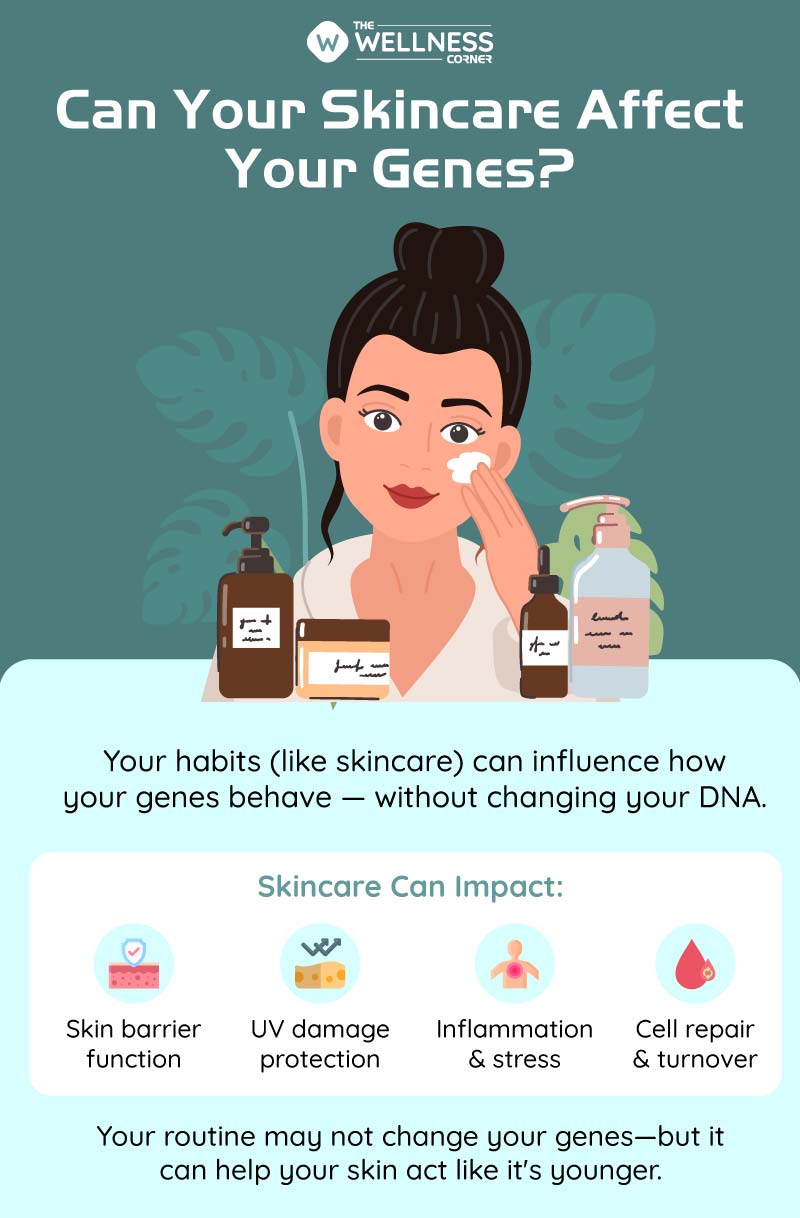Can Your Skincare Affect Your Genes?
- 3 months ago
We all know skincare matters. You cleanse, moisturize, and maybe even throw in a serum or two—hoping for brighter, smoother, younger-looking skin. But have you ever paused mid-routine and wondered, “Can my skincare go deeper—like, to my DNA?”
This question isn’t as far-fetched as it seems. With science evolving and skincare getting smarter, there’s a growing buzz around epigenetics—a field that suggests the products you apply could influence how your skin genes behave.
Let’s break it down. Can skincare affect your genes? What is epigenetic skincare and is it something you should care about? Let’s dive in.
Table of Contents
- First Things First: What Are Genes & Gene Expression?
- So… How Does Skincare Fit Into All This?
- What Is Epigenetic Skincare?
- Can Skincare Change Your Genes?
- What About DNA-Based or Genetic Skincare?
- Can Skincare Impact My Long-Term Health?
- What Role Do Genes Play in Skin Aging?
- Bottom Line
First Things First: What Are Genes & Gene Expression?
Think of your genes as a set of instructions—a genetic cookbook, if you will. These genes determine everything from your skin type to your hair texture. But here’s the twist: not every recipe in this book is read all the time.
This is where gene expression comes in. It’s the process that decides which genes get “turned on” or “off” depending on your environment, lifestyle, and yes—even skincare.
So while you can’t change your genes (your DNA is fixed), you can influence how those genes behave.
Also Read: 5-Minute Skincare Routine For Busy Corporate Girls

So… How Does Skincare Fit Into All This?
Your skin is the largest organ of your body. It's smart, dynamic, and surprisingly responsive. The creams, serums, and oils you use don’t just sit on the surface—they often penetrate deeper and interact with skin cells, which are loaded with genetic material.
When you apply skincare products containing certain active ingredients, you may trigger chemical signals that can activate or silence specific genes. That means your products might help improve how your skin:
- Repairs itself
- Produces collagen
- Fights inflammation
- Handles environmental stress
This concept is what’s fueling the epigenetic skincare revolution.

What Is Epigenetic Skincare?
Epigenetic skincare is a new approach where products are designed to influence gene expression—encouraging your skin to “act younger,” stay firmer, or repair damage more efficiently.
Think of it like giving your skin cells a pep talk: “Hey, collagen gene, wake up and get to work!”
These formulas often contain ingredients that:
- Encourage beneficial genes to turn on
- Quiet the ones involved in aging or inflammation
Some popular epigenetically active ingredients include:
- Peptides: Signal skin to produce more collagen
- Niacinamide: Calms inflammation and strengthens the skin barrier
- Retinol (Vitamin A): Boosts cell turnover and gene activity linked to skin regeneration
- Green tea extract & resveratrol: Rich in antioxidants that can influence gene pathways tied to damage and aging
These ingredients won’t rewrite your DNA—but they might optimize how your skin behaves.
Must Read: Skincare Advice Gone Wrong! What To Avoid?
Can Skincare Change Your Genes?
Let’s be clear: No skincare product can change your DNA.
However, skincare can influence how your genes are expressed—which in turn affects your skin’s appearance, resilience, and aging process.
Real-life example:
Have you ever noticed your skin looking dull after days of poor sleep or stress? That’s gene expression at play—your environment is affecting which skin functions are being prioritized.
On the flip side, using skincare with the right ingredients (like antioxidants or calming agents) might help switch on repair and rejuvenation genes, improving your skin’s response.
What About DNA-Based or Genetic Skincare?
Here’s where things get even more personalized.
DNA-based skincare involves getting a genetic test done—usually a cheek swab—to analyze your skin’s genetic traits. This test may reveal:
- How quickly your skin breaks down collagen
- Your tendency toward pigmentation or sensitivity
- Your antioxidant capacity (how well your skin fights off environmental damage)
Based on the results, a personalized skincare plan is designed with ingredients tailored to your genetic profile.
Sounds amazing, right? But there’s a catch:
- These tests are relatively new and not foolproof
- External factors (like diet, pollution, and stress) still have a major influence
- Results can vary, and not all companies offering these tests are backed by strong science
In short, DNA-based skincare is promising, but not yet a golden ticket.
Also Read: Can You Go Days Without Using Any Skin Product?
Can Skincare Impact My Long-Term Health?
Yes—and this goes both ways.
The Good:
Well-formulated skincare can support:
- Healthy Aging
- Stronger skin barriers
- Lower inflammation
- Better defense against pollutants and UV damage
Long-term, this could reduce your risk of:
- Premature aging
- Hyperpigmentation
- Chronic skin conditions like eczema or rosacea
❌ The Bad:
Skincare loaded with harmful chemicals (think parabens, sulfates, synthetic fragrances) might:
- Disrupt hormones
- Trigger inflammation
- Affects cellular health with prolonged use
So while your skincare may not “mutate” your genes, it can influence how your skin behaves and ages.
Also Read: How Do I Know If I Have Sensitive Skin?
What Role Do Genes Play in Skin Aging?
A lot, but not everything.
Your genes determine:
- Your baseline collagen production
- How fast you lose moisture
- Your natural ability to heal
- Whether you're prone to pigmentation or not
But here’s the good news: Only about 20–30% of skin aging is genetic. The rest is influenced by lifestyle.
This means:
- Sun protection
- Skincare routines
- Sleep, diet, and stress
…all play a huge role in how your skin looks at 40, 50, or beyond.
Bottom Line
Not exactly. You can’t change your genes, but you can support your skin to behave in a more youthful, healthy way.
That’s what epigenetic skincare is really about—giving your skin the tools to express its best self.
So next time you apply your serum, remember:
You might just be nudging your skin cells in the right direction.









